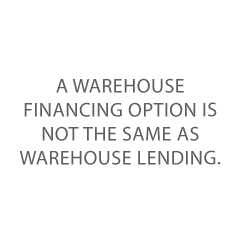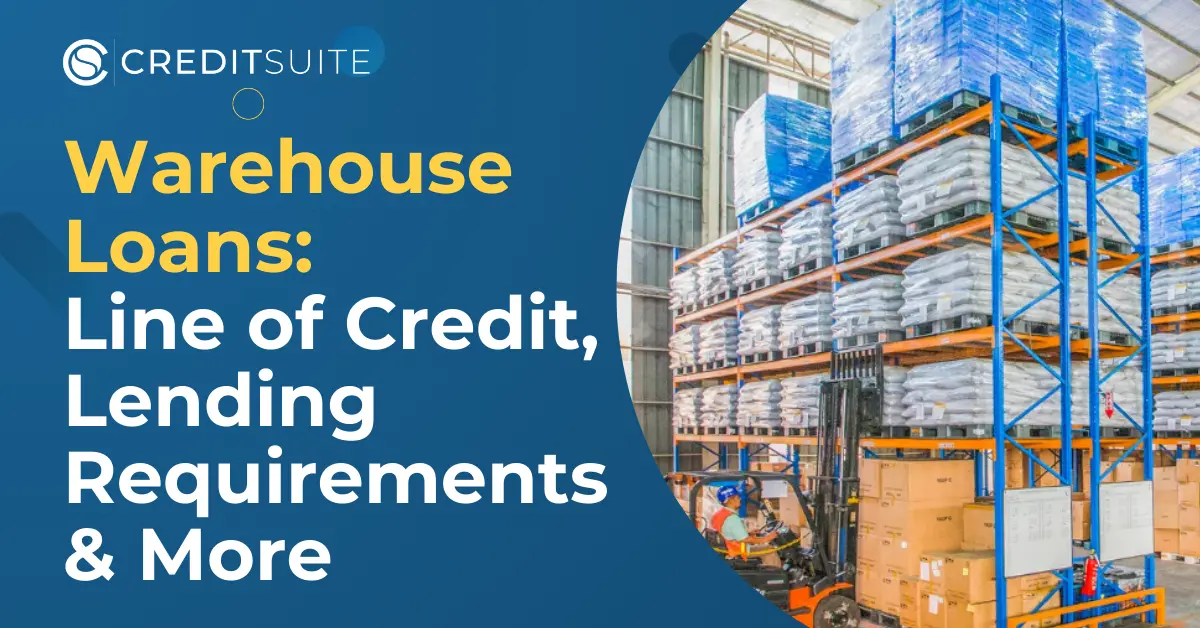Are you looking for a loan for warehouse facility use?
One big part of a business where you sell goods (as opposed to services) is that there’s all this … stuff. And you need to get it and park it somewhere.
Once your side hustle turns into a full-blown small business, you’ll need to go into production and make (and keep) more than just a few items around. Or it could be the raw materials for making your products. Either way, you need financing to buy or rent a building.
How Do Warehouse Loans Work?
The first thing to know is that warehouse financing and warehouse lending are not the same thing! A small business owner, over 99.99% of the time, would be looking for warehouse financing, seeing as a warehouse loan is actually for banks to use.
With this type of funding, in general, an entrepreneur will use raw materials or manufactured goods as collateral. In this way, it works differently from a mortgage loan, where the building secures the loan on it.
Therefore, it is a species of inventory lending. Warehouse financing is most often used by small commodities-related businesses that do not have access to other options for lending.
 A warehouse lender will determine the value of the assets and then extend a loan based on their designated value. A warehouse financing option is not the same as warehouse lending. Warehouse lending is a way for a bank to make loans without using its own money.
A warehouse lender will determine the value of the assets and then extend a loan based on their designated value. A warehouse financing option is not the same as warehouse lending. Warehouse lending is a way for a bank to make loans without using its own money.
Warehouse Lending vs Warehouse Financing
In common, ordinary parlance, we might use the two terms interchangeably. However, they are far from being the same!
According to Investopedia:
“Warehouse lending is a line of credit given to a loan originator. The funds are used to pay for a mortgage that a borrower uses to purchase property. The life of the loan generally extends from its origination to the time it is sold on the secondary market either directly or through securitization.”
You may have also seen the term CMBS loan in conjunction with warehouse financing, but that’s another term that does not truly apply.
Rather, CMBS stands for “commercial mortgage-backed securities.” These are commercial mortgage loans that are pooled into securities and sold on the secondary market to investors.
A warehouse receipt doesn’t apply, either.
Warehouse Loan Requirements
Keep in mind that information on a warehouse line of credit and the like is often mixed in with warehouse financing qualifications. The below information was extracted from the tangle of these similar terms.
In general, you will be looking to get a warehouse loan from independent mortgage bankers. Independent mortgage banks (IMBs) are nondepository institutions that often focus just on commercial mortgage warehouse lending and other types of lending.
 Mortgage banker qualifications for this type of lending. can be extensive.
Mortgage banker qualifications for this type of lending. can be extensive.
They can include demonstrating a track record of profitability and having only the best quality references. Some warehouse lenders may require a minimum net worth in the company such as half a million dollars.
The lenders will want to see this kind of net worth while a business meets liquidity requirements, too. Other qualification criteria can include a minimum time in business, a personal guarantee, and meeting a particular leverage ratio.
They are likely to be looking for good personal credit and probably also good business credit. Much like an investor, a mortgage lender may also want to check your cash flow.
As a result of these harder to meet requirements, warehouse funding is not going to be for every small business. Small business owners who have a poor personal credit score need not apply. The same is likely to be true for startups.
Leasing vs. Buying
Like with any commercial real estate transaction, you should consider the merits of purchasing versus a lease.
Buying will most likely mean you will need to put up significant money, although a mortgage can have rather long terms, just like a mortgage (home loan or personal loan) for a private residence. And, you could conceivably get a loan just to meet down payment requirements.
But that’s even more debt on top of debt. You will need to be certain that your small business will be able to make the payments over the course of the coming years.
Leasing will involve less money up front but a higher accrual of interest and interest rate during a much shorter loan term. However, another merit of leasing is that it may end up being easier to qualify for.
Some of your decision between the two should also hinge upon usage, and whether you think you will expand relatively soon (say, in the next five years). If so, then buying a warehouse may turn out to be better in the long run.
After all, there can be restrictions on how much you are allowed to modify a leased structure. But owning the building (and its land as well) outright will neatly bypass that potential issue.
Although you ought to recognize that zoning and local laws will also play a part in whether you will be allowed to expand or make modifications, or not.
Warehouse Financing Companies
Prosperity Bank
Prosperity Bank offers several types of business loans, for a loan amount from $15 million to $150 million. You can get jumbo business loans and bridge loans through them. Or get commercial real estate funding or SBA lending through them.
They offer 7a and 504 loans from the Small Business Administration. They also offer construction financing, so if you cannot get a preexisting warehouse property, perhaps your best option would be to construct one.
You can get a business credit card through them and a business line of credit as well. Their business credit lines have no annual fee if you are a ProsperityPrivate client.
They are also positioned more as a full service bank for small businesses, offering business checking accounts and a savings account, and online banking and money market accounts for businesses.
Prosperity also offers merchant services and treasury management services in addition to a commercial loan for your small business.
Qualifying
Yet some details are not on the Prosperity website, for apart from SBA loans, Prosperity does not outline any requirements for qualifying for any of its funding offerings. And, even then, they do not offer any specifics beyond what the SBA requires for any small business loan.
There isn’t even any information on the quality of credit they’re looking for.
It is highly likely that you will have to contact them directly, either by phone or via email. There is also a chatbot but its options are somewhat limited. Prosperity appears to be urging its customers to use the phone to contact them and not much else seems to be supported.
The State Bank
This lender offers commercial property financing for warehouses. Their specialty in commercial real estate loans specifically includes warehouses. State also offers business term loans and products from the SBA.
Takeaways
You can get lending for a warehouse, but be aware that what you find online may very well refer to an unrelated financial product.
You may need to provide a personal guarantee, but in the case of funding for a warehouse, a hit to your personal credit is likely to be worth it.

